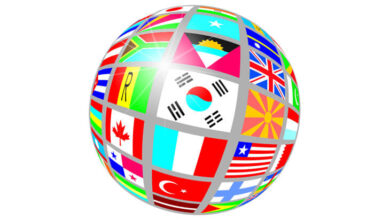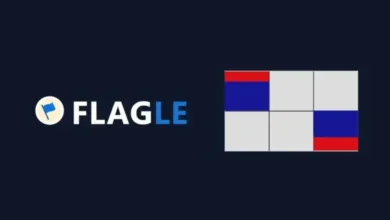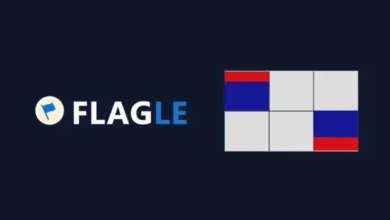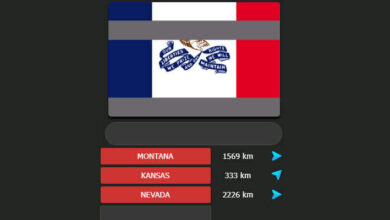The Rise of Flagle: A New Twist on the Wordle Phenomenon

In the ever-evolving world of online games, few have captured the global imagination as quickly and effectively as Wordle. This simple yet addictive word-guessing game became a cultural phenomenon, inspiring countless spin-offs and variations. Among these, one of the most intriguing and engaging is Flagle, a game that combines the mechanics of Wordle with the fascinating world of flags. In this article, we’ll explore the origins of Flagle, how it works, why it has become so popular, and what makes it a unique addition to the Wordle-inspired genre.
What is Flagle?
Flagle is a browser-based game that challenges players to guess a mystery flag within a limited number of attempts. Much like Wordle, players are given feedback after each guess to help them narrow down the correct answer. However, instead of guessing words, players are tasked with identifying flags from around the world. The game tests not only your knowledge of world flags but also your ability to deduce patterns, colors, and symbols.
The game typically provides a blank flag template, and players must guess the country or territory it represents. After each guess, the game offers clues, such as which colors or symbols are correct and whether they are in the right position. This iterative process continues until the player either guesses the correct flag or exhausts their attempts.
The Origins of Flagle
Flagle is part of a growing trend of Wordle-inspired games that adapt the original formula to new themes and challenges. Wordle’s success lies in its simplicity, accessibility, and the sense of accomplishment it provides. Developers quickly realized that the core mechanics could be applied to a wide range of topics, from geography to music to pop culture.
Flagle emerged as a natural extension of this trend. Flags are a universal symbol of identity, culture, and history, making them an ideal subject for a guessing game. The game’s creator, like many others in the Wordle-inspired community, saw an opportunity to combine education with entertainment. By focusing on flags, Flagle not only entertains but also encourages players to learn about different countries and their symbols.
How to Play Flagle
Playing Flagle is straightforward, but mastering it requires a combination of knowledge, strategy, and a bit of luck. Here’s a step-by-step guide to how the game works:
- Start the Game: Open the Flagle website or app. You’ll be presented with a blank flag template and a set of empty slots for your guesses.
- Make Your First Guess: Enter the name of a country or territory whose flag you think might be the correct answer. The game will accept most internationally recognized flags, including those of sovereign states, dependent territories, and even some regional flags.
- Receive Feedback: After submitting your guess, the game will provide feedback on your attempt. This usually includes:
- Correct Colors: The game will highlight which colors in your guessed flag match the mystery flag.
- Correct Positions: It will also indicate whether these colors are in the correct positions.
- Incorrect Elements: Any colors or symbols that don’t appear in the mystery flag will be marked as incorrect.
- Refine Your Guess: Use the feedback to make your next guess. For example, if you know that the mystery flag contains red and white but not blue, you can eliminate countries with blue in their flags.
- Repeat Until Solved: Continue this process until you correctly identify the mystery flag or run out of attempts (usually six guesses).
Why Flagle is So Popular
Flagle’s popularity can be attributed to several factors, many of which are shared with Wordle but with a unique twist:
- Educational Value: Flagle is more than just a game; it’s a learning tool. Players are exposed to flags they may not have encountered before, sparking curiosity about different countries and cultures. Over time, regular players find themselves becoming more knowledgeable about world flags.
- Global Appeal: Flags are a universal language. Whether you’re from the United States, Japan, or South Africa, you can appreciate the beauty and symbolism of flags. This global appeal makes Flagle accessible and enjoyable for players from all walks of life.
- Daily Challenge: Like Wordle, Flagle typically offers one puzzle per day. This creates a sense of anticipation and encourages players to return regularly. The daily format also prevents burnout, as players aren’t overwhelmed with endless content.
- Social Sharing: Flagle has embraced the social sharing aspect that made Wordle so viral. Players can share their results on social media, often using colored squares to represent their guesses without spoiling the answer. This fosters a sense of community and friendly competition.
- Simplicity and Depth: At its core, Flagle is simple to understand but offers depth for those who want to dive deeper. Casual players can enjoy the game without much prior knowledge, while enthusiasts can strategize and refine their guessing techniques.
The Educational Benefits of Flagle
One of the most compelling aspects of Flagle is its educational potential. In a world where geographic literacy is often lacking, games like Flagle provide a fun and engaging way to learn. Here are some of the key educational benefits:
- Flag Recognition: Regular players quickly become familiar with the flags of various countries, including lesser-known ones. This knowledge can be useful in academic settings, travel, or even trivia competitions.
- Cultural Awareness: Flags are rich with symbolism, often reflecting a country’s history, values, and culture. By learning about flags, players gain insights into the stories and traditions of different nations.
- Geography Skills: Flagle encourages players to think about the world map. For example, if a flag features a crescent moon, players might deduce that it belongs to a country in the Middle East or North Africa.
- Critical Thinking: The game requires players to analyze patterns, eliminate possibilities, and make logical deductions. These skills are valuable not only in gaming but also in real-life problem-solving.
Tips for Mastering Flagle
If you’re new to Flagle or looking to improve your skills, here are some tips to help you succeed:
- Start with Common Flags: Begin by guessing flags from well-known countries. This increases your chances of getting some correct colors or symbols early on.
- Pay Attention to Color Patterns: Many flags share similar color schemes. For example, red, white, and blue are common in many national flags. Use this knowledge to narrow down your options.
- Look for Unique Symbols: Some flags feature distinctive symbols, such as stars, crescents, or animals. These can be key clues in identifying the correct flag.
- Use Process of Elimination: If you know certain colors or symbols are incorrect, eliminate flags that include them. This will help you focus on the remaining possibilities.
- Learn from Mistakes: Don’t be discouraged by incorrect guesses. Use them as learning opportunities to improve your knowledge and strategy.
The Future of Flagle
As Flagle continues to grow in popularity, it’s likely that we’ll see new features and variations emerge. Some potential developments include:
- Themed Puzzles: Special editions of Flagle could focus on specific regions, historical flags, or even fictional flags from movies and books.
- Multiplayer Mode: A competitive or cooperative multiplayer mode could add a new dimension to the game, allowing players to challenge friends or work together to solve puzzles.
- Expanded Content: The game could expand to include other types of symbols, such as coats of arms, national emblems, or even corporate logos.
- Mobile App: While Flagle is currently browser-based, a dedicated mobile app could make the game even more accessible and user-friendly.
Conclusion
Flagle is a shining example of how a simple concept can be transformed into something both entertaining and educational. By combining the addictive mechanics of Wordle with the rich symbolism of world flags, Flagle has carved out a unique niche in the world of online games. Whether you’re a geography enthusiast, a casual gamer, or someone looking to learn something new, Flagle offers something for everyone. As the game continues to evolve, it’s sure to inspire even more players to explore the fascinating world of flags. So why not give it a try? You might just discover a new passion for vexillology—the study of flags—along the way.




